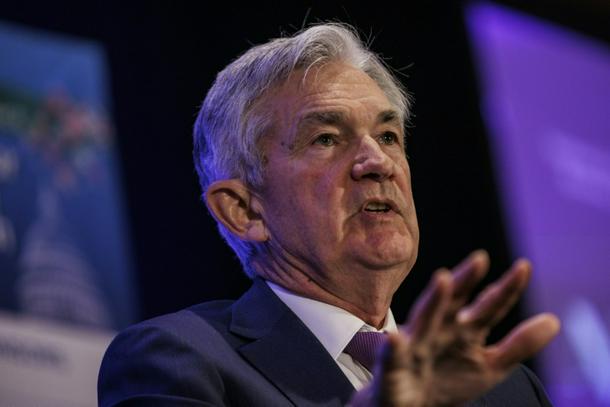
Federal Reserve Board Chair Jerome Powell has signaled the US central bank will have to move more aggressively to counter record US inflation
Hong Kong (AFP) - Most Asian markets dropped on Friday, trailing Wall Street losses triggered by the US Federal Reserve boss’ signal of an aggressive monetary policy tightening cycle and the ongoing economic impact of Covid-19 restrictions in China.
Tokyo ended more than 1.5 percent down even as inflation data from Japan was in line with market expectations and better than elsewhere in the world.
A falling yen, due mainly to the interest rate gap between Japan and the United States, had boosted trade on the Nikkei 225 all of this week, but it was not enough to alleviate concerns around the prospect of rate hikes in the United States.
And a report that Japanese Finance Minister Shunichi Suzuki and US Treasury Secretary Janet Yellen have discussed coordinated currency intervention to combat skyrocketing global inflation strengthened the yen on Friday.
Seoul, Sydney, Jakarta, Mumbai and Taipei were also all down.
But Shanghai pulled back marginally as some restrictions in China were eased and the country’s securities regulator pushed banks and insurers to buy more stocks to lift ailing equities – although the impact was minimal.
Hong Kong, which has been down all week and plummeted on Friday, also recovered slightly after the midday break thanks to a tech-stock recovery and was only fractionally lower at the close.
Fed Chair Jerome Powell’s comments that a half-point interest rate increase is “on the table” for next month’s policy meeting – with the United States facing decades-high inflation – reversed fortunes on Wall Street mid-session.
“Federal Reserve Chairman Powell stopped an intraday equity rally in its tracks overnight, after he signalled a 0.50 percent rate hike in May,” said Jeffrey Haley, Asia-Pacific Senior Market Analyst at Oanda.
“Mr Powell cited a tight labour market and inflation at multi-decade highs. Fellow President Mary Daly also suggested 0.50 percent hikes, while the bull in the monetary China shop, James Bullard, reiterated his enthusiasm for 0.75 percent hikes.”
Major US indices all finished down more than one percent, while the dollar pushed higher against the euro and other currencies.
Frankfurt and Paris enjoyed gains before the announcement but opened more than one percent lower on Friday under the weight of Powell’s comments. London, which ended flat, was also down in early trade.
Oil prices also took a hit over the Fed’s potential monetary policy tightening and dwindling energy demand in China.
Crude is trading 35 percent higher this year, with supply roiled by the war in Ukraine and protest-related disruptions in Libya. Calls for the European Union to ban Russian imports are also growing.
But prices have fallen more than four percent this week.
“Russian production decreased, pointing to self and official sanctions starting to bite oil prices bullishly,” Stephen Innes at SPI Asset Management.
“It is Friday, and typically, no one wants to go short oil into the weekend for fear of dreadful Ukraine weekend headline risk. So that suggests to me that oil holds a bid barring awful news out of China on the Covid front, where there seems to be some light at the end of the lockdown tunnel.”
- Key figures around 0815 GMT -
London - FTSE 100: DOWN 0.32 percent at 7,603.87
Frankfurt - DAX: DOWN 1.11 percent at 14,342.11
Paris - CAC 40: DOWN 1.92 percent at 6,652.75
Tokyo - Nikkei 225: DOWN 1.63 percent at 27,105.26 (close)
Hong Kong - Hang Seng Index: DOWN 0.21 percent at 20,638.52 (close)
Shanghai - Composite: UP 0.23 percent at 3,086.92 (close)
Euro/dollar: DOWN at $1.0801 from $1.0840
Dollar/yen: DOWN at 128.12 yen from 128.35 yen
Pound/dollar: DOWN at $1.2906 from $1.3029
Euro/pound: UP at 83.67 pence from 83.14 pence
Brent North Sea crude: DOWN 0.74 percent at $107.53 per barrel
West Texas Intermediate: DOWN 0.68 percent at $103.08 per barrel
New York - Dow: DOWN 1.1 percent at 34,792.76 (close)
burs-ssy/cwl